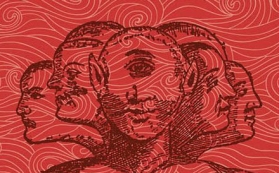
That the first poem in Sean Wai Keung’s debut pamphlet begins with the phrase ‘the most important principle is the principle/of never looking back…’ is apt as it lays down immediately two key structural strategies of his writing, both of which give you are mistaken its impressive sense of bewildered/neurotic/eccentric thoughtfulness.
The first is his use of unpuncuated repetition. Almost all of the poems here repeat individual words, phrases, sentence structures, images, and symbols in the intense and exhausting manner of an obsessive. Over the course of twenty poems this builds into an impression of the speaker (we probably do Wai Keung a disservice to assume that it is meant to be him, but that seems a fair conclusion) as a teenage or young-adult misfit who can filter neither his emotions nor his outbursts (‘+ so I said to the guy what…’) but who is also oddly introverted and stands silently at the shopping checkout watching his customers, lost in thought until he blurts some muttered phrase under his breath (‘the gift’), and who thinks constantly about the girl/boy who he loved but who never loved him and left Norwich for some far-off city (‘over skype…’). But this is ultimately, we feel, someone who would rather be explaining Chinese philosophy to his friends than talking yet again about his poetry or his mixed heritage when neither are understood by any of those around him (‘i think i want to write about race’ and ‘you are mistaken’ respectively). The constant wall of repetition and the impression that no one understands add to a sense of alienation and isolation, which is emphasised by the use of Chinese characters as titles for some of the poems – the non-Chinese-speaking reader is distanced from these poems by their titles and we feel for a moment something of what it is to be Not Entirely Part Of Something (and, equally, to need to have it explained).
Which leads to the second of the strategies used by Wai Keung, that is negation. Negatives abound in this pamphlet, adding to both the feeling of alienation and the youthful sullenness of the character we are hearing speak through the poems, but it also serves to emphasise the points he is making about stereotypes, misunderstandings, and myths which also abound when his Chinese heritage grates against the British culture around him:
‘those/translations aren’t completely right’ (‘三寶 [慈 -儉 -不敢為天下先]’)
‘they say they said i was none of those things/but don’t worry/its not a big deal’ (‘cny 2016’)
‘its not enough/you say/this/isn’t/enough’ (‘stealing table sauces from wetherspoons’)
‘…asia + europe used to be the same/massive place but now they arent’ (‘太極’)
‘which isn’t to say that yin promotes’ (‘陰’)
‘which isn’t to say that yan promotes’ (‘陽’).
All of this, of course, is entirely appropriate in a pamphlet entitled you are mistaken; and throughout we are being corrected in our potential misconceptions of what it means to be of mixed Chinese-British heritage and living in Britain. These are unlikely to be mistakes that any single individual would make (they are not only one person’s prejudices) but another effect of the repetition and negation is to make the reader feel the cumulative force of small-stereotype-upon-small-stereotype. It is slightly wearying, but it is meant to be.
The apotheosis of both these strategies comes in the title poem itself, which is a dense page-and-a-half block (indeed, two blocks) of negatively framed stereotype-corrections that build up into an overwhelming monolith of words. All the subtlety and grace of the other poems’ pagination is thrown out here, and we are made to feel that the quiet, shy, intelligent/eccentric boy (all part of the Asian stereotype, perhaps) is starting to lose his patience. When read out loud as a list (see Wai Keung performing with Kevin Bateman and others here) there is a controlled irritation about this poem, which because of the sheer quantity of observations feels as though it is just brimming over into anger.
Some of the poems work extremely well on their own; the yin/yang duo are particular successes, finding a powerfully ironic metaphor for the balanced duality of 陰 and 陽 in the circular centrality of pornhub.com and the slightly surreal, almost comic image of hermaphroditic self-sex. Others, like the ‘16 slices’ placed opposite the yin/yang poems, and ‘earnings’, are amusing and intriguingly experimental but add more to the overall feeling of unconventionality than to the many insights of the pamphlet. Although, having said that, the reference to ABBA’s ‘Money, Money, Money’ in the receipt-misprint ending of ‘earnings’ is one of the funniest moments in the pamphlet, and probably worth inclusion on that basis alone.
This will, I hope, be the first of many collectionsfrom Sean Wai Keung. The strategies this review has focused on work well in the context of the twenty poems on show here, but it would be difficult to maintain interest in this way over a full collection, even more so over several; being trapped by repetition and oppressed by negatives reveals much in the way of in-grown attitudes but it can also be emotionally and tonally limiting. To this extent, 無極, the final poem of the pamphlet, is perhaps auspicious as it is low on negatives, subtle in its repetitions, and it ends with ‘…just look out of the window now look/how did that get there’. Does this indicate that Wai Keung will turn in future as much towards what is as what isn’t? I look forward to finding out.
Sean Wai Keung’s You Are Mistaken is published by The Rialto (£7) and can be bought here.

